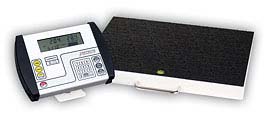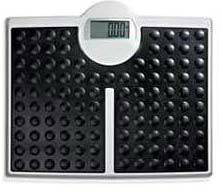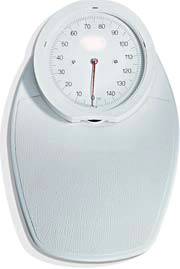Home » Hospital & Durable Medical Equipment » Medical Scale: An Indispensable Diagnostic Tool » Medical Scale: An Indispensable Diagnostic Tool
Medical Scale: An Indispensable Diagnostic Tool

General Purpose Digital Floor Scale w/ Indicator
Retail Price: $1,571.36
Your Price: $1,355.69
 Unit: single
Unit: single

Seca Digital Floor Scale w/ Large LCD Display
Retail Price: $228.85
Your Price: $149.89
 Unit: single
Unit: single
One of the most important, most used pieces of equipment for a physician is the Hospital Scales. It's frequent use is often taken for granted, though. In fact, many physicians seem to overlook this tool even as they pass it several times a day, but Medical Scales & Hospital Scales is an indispensable tool that is a source of information for the physician and a source of dread for some patients.
At the time the patient is admitted, his weight is assessed. The Hospital Scales that is used to determine his weight must be accurate and easy to use. Ease of use is a critical factor since it is not only the physician who uses the Hospital Scales. More often than not, it is operated by either a nurse or a physician's assistant. These vital members of the doctor's office and hospital do not have any spare time to figure out how to use a complicated Hospital Scales. Nor do they have the time to go through a long series of steps in order to use it. The time that a patient waits can be cut shorter by the rapid turn around of patients who undergo the preliminary screenings with a Blood Pressure Cuffs, Stethoscopes, and Hospital Scales. The sooner the nurse can get through these tasks, the sooner he can go to serve the next patient.
Having an accurate Hospital Scales to give the weight for the patient is crucial for the physician, since weight plays such an important aspect in every medical area from diagnostics to treatment. Many diseases have the patient's weight as a critical risk factor. Heart disease, hypertension, diabetes, and even insomnia have excess weight as a risk factor. Obseity can also lead to complications in these ailments. For a doctor to make a good diagnosis, he must have the right data. This data, such as weight, guides the practitioner to know which course of action to take in the treatment process. Knowing how much excess weight a patient has allows the doctor to give the proper recommendations to the patient concerning weight loss and maintenance for optimal health.
The accuracy of a hospital scale is very important, because a margin of error of three to five pounds is unacceptable since that could be the difference between a normal weight and overweight patient or an overweight and obese patient. Common medical knowledge holds that the obese have different health needs and risks than those who are simply overweight. An accurate hospital scale can give information that can be trusted by the physician.
A Hospital Scales gives a measure of the patient's weight, without which, the practitioner would be unable to prescribe the correct dosage of medicine. If the doctor overestimates the patient's weight, the prescription will be too strong. Without a Hospital Scales, the weight might be underestimated and the dosage would be ineffective. In cases of administering life-saving daily medications such as hypertension and diabetes drugs, this could be a fatal error that could cause the patient his life and the doctor his license. Accuracy and ease of use are the goals that should be achieved in any quality Hospital Scales the practitioner uses.















